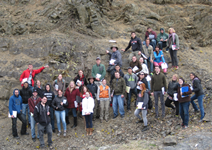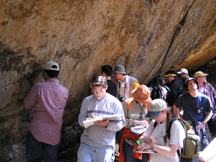Major and Minor in Geology
Major
|
The science of geology is concerned with the physical and chemical nature of the Earth (and other planets) and the evolution of the Earth over the vast expanse of geological time. The major prepares the student for graduate study and professional work in geologic disciplines. Students graduating with a B.S., majoring in geology, typically go on to graduate school or obtain professional employment with environmental consulting firms, energy and resource exploration firms, or various government organizations. |
 |
Major Requirements
Requirements for the Geology major can be found in the Undergraduate Catalog. For direct access, click here.
Programs of Study
The Geology B.S. program has built-in flexibility to allow majors to choose from a variety of electives in environmental geoscience, planetary geoscience, geophysics and geochemistry. Completion of the Geology major requires 66 to 68 credits. For students with an interest in Geology, Environmental Geosciences, or Geological Oceanography, the department has designed suggested course clusters with the goal of maximizing the students' knowledge base in these rapidly growing fields.
- The Geology cluster is for students who wish to maximize their exposure to fundamental geological methods and fields of study, with suggested electives in field geology, research, geophysics, hydrogeology, and glacial geology.
- The Environmental Geosciences cluster is designed for students interested in environmental science, with additional laboratory and field courses focused on evaluating environmental problems. Many students take advantage of internships with local environmental companies or the United States Geological Survey as part of their academic program.
- The Geological Oceanography cluster is for those who want to study both geology and marine sciences by combining select courses from the geology track with marine science courses.
Undergraduate ResearchAll faculty within the Department of Geosciences have active research programs that welcome undergraduate participation. Many of our majors become involved in the excitement of laboratory or field research as part of their undergraduate studies. Our undergraduate researchers are part of the fabric of the department and have presented their work at conferences nation-wide. Acceptance into a research program is done on an individual basis and is dependent on the identification of a faculty sponsor. |
 |
Dual Majors
Geology is an interdisciplinary subject that attracts students interested in a variety of fields of science and mathematics. Dual majors are common and the academic programs in the Department of Geosciences are flexible enough to accommodate such efforts. For those interested in provisional certification as a secondary school teacher of earth sciences in addition to a B.S. in Geology, the department offers dual majors in Geology and in Earth and Space Science (Earth Science Education Track) with many overlapping requirements.
Minor
For students majoring in other disciplines who are interested in obtaining a fundamental understanding of the earth sciences, a minor concentration in geology is available. The geology minor acquaints students with earth materials, the origin and evolution of life on earth, and physical processes that have shaped the earth through time. All courses offered for the minor must be passed with a letter grade of C or higher. The minor requires 20 credits.
Course requirements
All courses taken to meet requirements for the geology major must be taken for a letter grade and passed with a grade of C or higher.
For a listing of all geoscience courses and their descriptions, please see the Undergraduate GEO Course Descriptions in the Undergraduate Catalog.
Geology Major Advisor:
Professor Marine Frouin
Room 354 ESS Building
Tel. (631) 632-1429
Email: marine.frouin@stonybrook.edu
